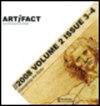Behavioral Artifacts: What is an Artifact? Or Who Does it?
Q2 Arts and Humanities
引用次数: 5
Abstract
The word “artifact” comes from two Latin words. The first, “arte”, means “by skill”, from “ars”, skill. The second, “factum”, is the past participle of “facere”, to do or to make.The word dates back to the early 1800s, meaning “something created by humans usually for a practical purpose; especially: an object remaining from a particular period” and “something characteristic of or resulting from a particular human institution, period, trend, or individual” (Merriam-Webster, 1990, p. 105). Most definitions focus on the quality of artifacts as things, speaking of objects and remains rather than process or production. Typical definitions are “anything made by human art and workmanship; an artificial product. In archeology, applied to the rude products of aboriginal workmanship as distinguished from natural remains”, “a product of human art or workmanship”, “any object made by human beings” (Oxford English Dictionary, 2006, n.p.; Shorter Oxford English Dictionary, 1993, p. 120; Wordsmyth, 2006, n.p.).I am as interested in the artifacts of doing as in the artifacts of making. Many artifacts exist only in human behavior, individual and social. These are the focus of this essay.行为工件:什么是工件?或者谁做的?
“神器”这个词来自两个拉丁单词。第一个单词“arte”的意思是“通过技能”,来自“ars”,意思是技能。第二个词“factum”是“facere”的过去分词,意为“做”或“制造”。这个词可以追溯到19世纪早期,意思是“人类通常为了实用目的而创造的东西;尤指:某一特定时期遗留下来的物品”和“某一特定人类制度、时期、趋势或个人的特征或结果”(韦氏词典,1990年,第105页)。大多数定义关注的是作为物的工件的质量,谈论的是对象和残留物,而不是过程或产品。典型的定义是“任何由人类艺术和工艺制成的东西;人造产品在考古学中,用于指与自然遗迹不同的土著手工制品,“人类艺术或工艺的产物”,“人类制造的任何物品”(《牛津英语词典》,2006,n.p.;《简明牛津英语词典》,1993年,第120页;Wordsmyth, 2006, n.p.)。我对做的人工制品和制作的人工制品一样感兴趣。许多人工制品只存在于个人和社会的人类行为中。这些是本文的重点。
本文章由计算机程序翻译,如有差异,请以英文原文为准。
求助全文
约1分钟内获得全文
求助全文
来源期刊

Artifact
Arts and Humanities-Visual Arts and Performing Arts
CiteScore
0.50
自引率
0.00%
发文量
0
审稿时长
20 weeks
 求助内容:
求助内容: 应助结果提醒方式:
应助结果提醒方式:


